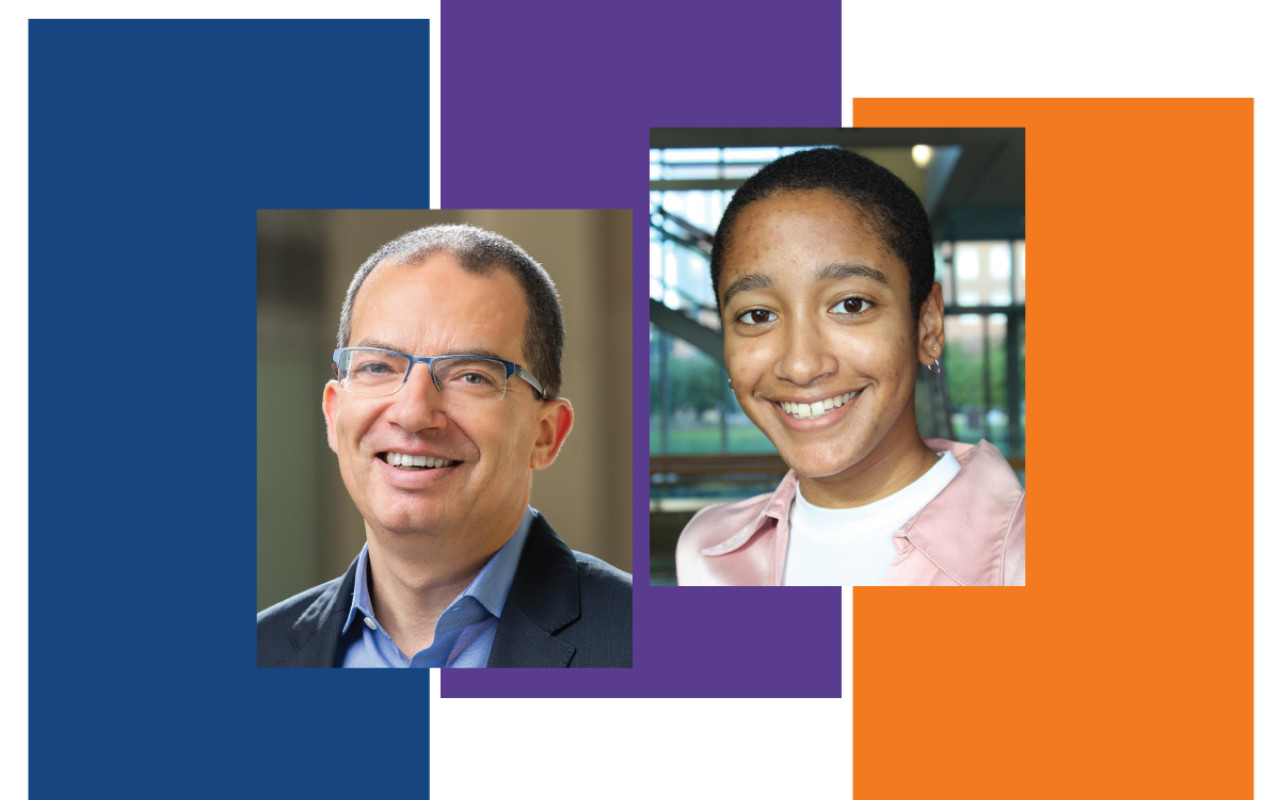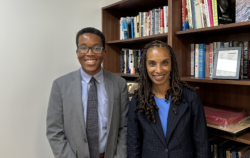
Ubben Posse Fellow Interviews: Stéphane Bancel
The Jeff Ubben Posse Fellows Program awards five exceptional Posse Scholars $10,000 each and the chance to spend 4-6 weeks during the summer shadowing and learning from a major industry leader. The interview below with Stéphane Bancel, Moderna, Inc. CEO, was conducted by Posse Scholar Monica Bradford, now in her junior year at Denison University, who worked with Stéphane Bancel as a 2022 Jeff Ubben Posse Fellow. The conversation has been edited and condensed.
MONICA: To start off, I’d like to ask about who raised you. How do you feel they’ve influenced your leadership style?
STÉPHANE BANCEL: My mom and my step-dad. My parents got divorced when I was eight, and my mom found a great partner a few years later. They both raised me. My mom is super demanding, so that is part of my leadership style. Being raised in the culture of honesty and saying what’s on your mind, not being political or complicated, has a big impact on my leadership style. They also gave me the idea that I was not going to work in France. They were always talking about the U.S., Asia, and other countries in Europe, so they prepared me to be adventurous and sort of a global citizen. I ended up doing an internship in the U.S. when I was a teenager where we were helping physically handicapped people do jobs like putting flyers in envelopes. That is one example of trying to spend time outside of France at an early age.
What was your dream job as a kid?
It’s funny, my dream job as a kid was actually to run a tech company. I mean, when I was eight I wanted to be a fireman, but this was my dream once I became a teenager.
In my teens I was very influenced by my uncle, my mom’s brother. He was a successful business guy in tech companies in the U.S. At that time, technology was attempting to expand, and I don’t know why I had the daydream of being the CEO of a tech company. I wanted to be in a place where science and engineering were at the core of making the world a better place. I had no vision of size, so I would have been happy to be the CEO of a 10-person company. What I’ve done over my career is build over blocks, doing the science and engineering first, biology, my MBA, then going to a big company to learn. It was all to give me the tools so I could have the chance to do my dream job one day.
I was very fortunate to have a crazy dream early because it allowed me to lay the foundation.
Who taught you to take that approach?
My uncle really influenced me. There was a day in my life I remember perfectly because it changed my life forever. It was the summer, and we were sitting by his pool. He was always working, so we would see him once every couple of weeks. I was 20 and had just been admitted to my dream school, but they required me to learn a third language. So I asked him, “Should I learn German or Spanish?”
And my uncle is very blunt. He told me I was asking the wrong question, that I should have asked whether I should learn Chinese or Japanese. He told me not to waste time on Chinese because I have no musical ear and would never learn it. So I decided to learn Japanese and fell in love with Japanese language and culture. I applied for an internship in Japan and I believe that one of the reasons I got admitted to Harvard for my MBA was because I stood out as having different experiences.
How do you have the confidence to make these things happen?
I believe that I will always land on my feet. My style is to start running with the technology and make adjustments as the process goes along.
People always tell me it must have been hard to choose to go after COVID, but it was easy. In a lot of companies, they make lists of pros and cons, weigh out the risks and scenarios, and come up with a plan before they start running. That is totally against what I do at Moderna. We have a big idea or dream and start running, but as things happen we correct course, learning and moving along the way. If we spend too much time planning, I feel anxious to get moving. That’s just the way I’m wired.
The reason we started running after mRNA first is because it was a crazy idea. I told my wife before we started to do it that it had a 5% chance of working. But I was willing to take that crazy bet—because if it works, it is either zero or one. I told her if it works, it will impact medicine forever and mRNA will be a new class of medicine that will impact billions of people in the next hundred years.
It was this crazy assessment of impact versus risk; if it went bankrupt and I lost my job, I would probably fall back on my feet. That’s my downside scenario, and my upside scenario is that we do something that will help billions of people. So in the end, the asymmetry actually made the decision very easy. When I start to think of all the things that could go wrong, I go crazy and lose the ability to see the tree through the forest. Since I know how to fall back on my feet, I easily favored the option that would potentially help the world.
How does that mindset impact your leadership style at Moderna?
I lead with my personality, and, over the years, I have learned from mistakes and my leadership style has changed. The boldness and relentlessness that are part of my values are just how I am wired as a person. I have used those values to help or coach people.
I remember one time we had two meetings with the chief medical officer during one week. The plans were were not exciting. In the olden days I would have had a hard time explaining my frustrations, but at the end of that meeting I sat him down and told him the reason I was frustrated was simple: the plans were not bold.
I use my values to help calibrate what is not quite right. This is why I always advise candidates at Moderna to read about the values before they come here. If the values make them nervous, they should run the other way because they will have a terrible time. Our mission is who we are as a company.
When we started, I was super hands-on. But as we grew, the failure point started to change. Every quarter I spend time at home thinking about where the company is heading in the next three to five years and think about what CEO the company will need. I cannot be the same CEO that I was when the company started, so I adapt my leadership style to what the company needs. I always try to think about the time horizon when I am working to reinvent myself in this way. I try to get a very clear picture of the future of the company in my head, and sometimes it takes a couple of hours to do that. Then, when I picture a company I am comfortable with, I start to think about the CEO role.
The hardest thing for me doing this job has been that every day I have been the CEO of Moderna. Even Steven [Hoge] has had three different titles over the years. The company changes every day, but slowly. If you don’t check in with yourself regularly, you are going to boil like a frog.
The pace at which Moderna has been growing has been the biggest challenge because it requires adaptation. I try to ease my employees into the changes I make to the company and talk about it a lot. I cannot force them to change with the company, I can only coach them about why it is important and suggest tools and techniques to start them thinking about it. I give them examples of what I have learned over the years as an example to get them thinking. It is very important that people understand why this is an important change. Sometimes it is best practice to cut one’s job into smaller pieces so that they can still be successful at the company.
What do you feel like makes you stand out as a leader in your industry?
I think I am bold, and I am very long-term driven.
In addition, because of the jobs I have done, I have a very good understanding of the enterprise. I can talk science with the scientists, manufacturing process with those who are trained in process development, and understand finance and research and development. Many CEOs in the industry only understand the business side of things, and that makes me stand out. Being an engineer by training, working at a science-based company, having been in manufacturing at a commercial scale, having been a sales representative and sales manager, having been a CEO before, too, has had a tremendous impact on my success at Moderna.
Being blunt and bold also saves me time. The only thing you cannot buy is time, and I think a really interesting thing about business is that time makes it a very level playing field. Sometimes money can be used to save time, but I think the ability to be blunt saves so much time and gives organizational clarity. A lot of times in large organizations, employees do not know what the priorities are, it is just whoever shouts the loudest. So I think being blunt helps with speed and clarity within the organization.
Do you feel being an immigrant has changed your leadership style or your view of the pandemic?
I think I am much more tolerant and patient of people’s ability to express themselves clearly in a foreign language. When I was at my old company, I was shocked that one of my best employees, a Chinese man, could not get the time of day from most other members of the company because they could not see through his accent. They could not see how good he was at what he did.
I remember when I was looking for a job after my MBA, a lot of companies would not even consider getting a visa for me. So, having gone through the process myself, we at Moderna find good lawyers in Boston and pay as a company for the visas. I have access to talent at Moderna that a lot of other companies do not, simply because they do not know how to get the visa thing done. As soon as people get into the country, we sponsor them for their Green Card so they do not have to go through the visa process anymore.
I think people who have felt uncomfortable in previous jobs might give me more because they are happy and respected for who they are. My priority is to hire people for who they are and the technical skills they have, their values and fit with the culture, and for the potential they have to grow and do great things.
Read More:
Ubben Posse Fellow Interviews: David Solomon
Ubben Posse Fellow Interviews: Christine Squires
Ubben Posse Fellow Interviews: Sen. John Hickenlooper
Meet the 2022 Jeff Ubben Posse Fellows.

